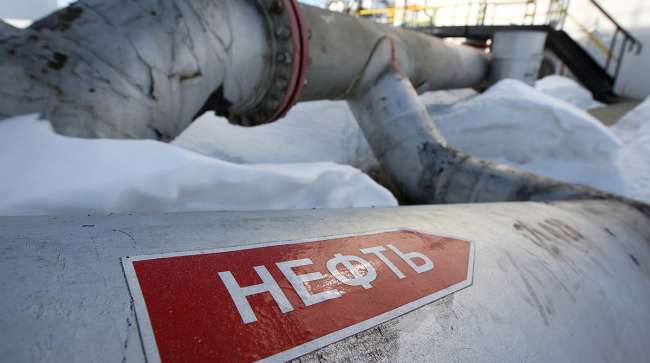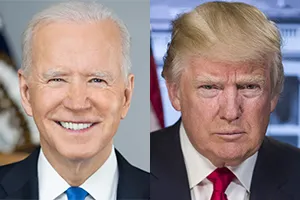Trump Team Readies Oil Sanctions Plan for Russia Deal

[Stay on top of transportation news: Get TTNews in your inbox.]
Advisers to President-elect Donald Trump are crafting a wide-ranging sanctions strategy to facilitate a Russia-Ukraine diplomatic accord in the coming months while at the same time squeezing Iran and Venezuela, people familiar with the matter said.
The outgoing Biden administration on Jan. 10 imposed the most disruptive sanctions on Russia’s oil trade by any Western power to date. The move created an open question about how Trump views the measures, given his commitment to quickly ending the war in Ukraine.
There are two main approaches under consideration by the Trump team. One set of policy recommendations — if the incoming administration believes a resolution to the Ukraine war is in sight — involves some good-faith measures to benefit sanctioned Russian oil producers that could help seal a peace deal, said the people, requesting anonymity as the deliberations are private. A second option would build on the sanctions, ramping up pressure even further to increase leverage, they said.
The approach that Trump ultimately chooses is pivotal to the global oil market. Brent futures have gained almost $5 a barrel since Biden’s measures were announced. Some analysts anticipate further gains, something that would drive up fuel costs around the world.
.@TreasuryDept is taking sweeping action to fulfill the G7 commitment to reduce Russian revenues from energy, including blocking two major Russian oil producers. The UK is also joining Treasury in sanctioning two major Russian oil producers. https://t.co/N72uy0y7Ia — Treasury Department (@USTreasury) January 10, 2025
The Trump team’s plans are in the early stages and ultimately depend on the president-elect himself, the people said. Last week, Trump said a meeting with Russian President Vladimir Putin was being set up, raising the prospect of potential near-term negotiations to end the war.
The strategy discussions include some of Trump’s Cabinet nominees as well as former sanctions officials in his first administration, the people said. Several conservative-leaning think tanks are also being sounded out. The transition team has yet to announce Trump’s picks for some key roles involved in economic statecraft.
Among the lingering questions are whether Brad Smith and Andrea Gacki, two U.S. Treasury Department veterans, will stay on in senior roles.

Joe Biden and Donald Trump.
Trump’s advisers will ultimately be wrestling with the same question as the Biden administration — how to avoid major supply and price disruptions to the oil market at a time when Washington has extensive sanctions on three of the world’s top producers. Another challenge: calibrating the right balance between leveraging the tools of economic warfare with the desire to maintain the dollar’s status as the global reserve currency.
Spokespeople for Trump’s transition team didn’t respond to an emailed request for comment.
An early barometer of how the Trump team tackles sanctions on Russia will come in mid-March when a general license permitting a wind-down in purchases of Russian energy products is set to expire. If the Treasury Department allows the exemption on some transactions to lapse, it could ratchet up pressure on the Kremlin.
On Jan. 15, officials introduced measures to make it harder for Trump to lift some of the sanctions on Russia unilaterally. They re-designated several entities, requiring the president to notify Congress if he plans to lift restrictions on them, potentially triggering a vote of disapproval if members object.
Truck Parking Club's Evan Shelley discusses how innovative platforms are turning available space into opportunities for reserved parking. Tune in above or by going to RoadSigns.ttnews.com.
For the Trump team, a more aggressive Russian policy mix could entail greater enforcement of secondary sanctions on oil trading, penalizing European shippers as well as Asian buyers, including major entities in China and India, the people said. Another possible approach: pushing for more assertive interventions on tankers moving Russia’s oil through the vital Danish and Turkish chokepoints.
A softer-touch scenario might mean issuing general licenses and lifting the price cap to higher than $60 per barrel — moves that would encourage Russian oil to keep flowing to the market.
In his confirmation hearing on Jan. 15 for secretary of state, Marco Rubio cited the sanctions as a key piece of leverage that could bring about a peaceful resolution.
Elsewhere, the Trump team is also assessing policy options for Iran and Venezuela.
There’s a general consensus among his key advisers to return to a full maximum pressure strategy targeting Tehran, starting with a big sanctions package that hits major players in the oil industry, which could come as early as February, the people said. During Trump’s first term, a similar approach significantly curtailed Iranian oil exports, though they’ve climbed since President Joe Biden took office.
Want more news? Listen to today's daily briefing above or go here for more info
The situation is more complex in Venezuela, where long-time ruler Nicolas Maduro just got sworn in for another term amid widespread evidence of election fraud but U.S. oil firms like Chevron Corp. also have a presence.
Maduro survived the Trump administration’s maximum pressure strategy, even as it curbed the nation’s oil exports, and also outlasted an effort by Biden officials to facilitate free and fair elections. Mauricio Claver-Carone, an influential adviser during Trump’s first term, will be returning to a prominent role on Latin America, and there’s a desire to restore the more aggressive posture he helped steer around 2019, when the U.S. stopped recognizing Maduro as the legitimate president of Venezuela, the people said.
Written by Ben Bartenstein, Nick Wadhams and Daniel Flatley





